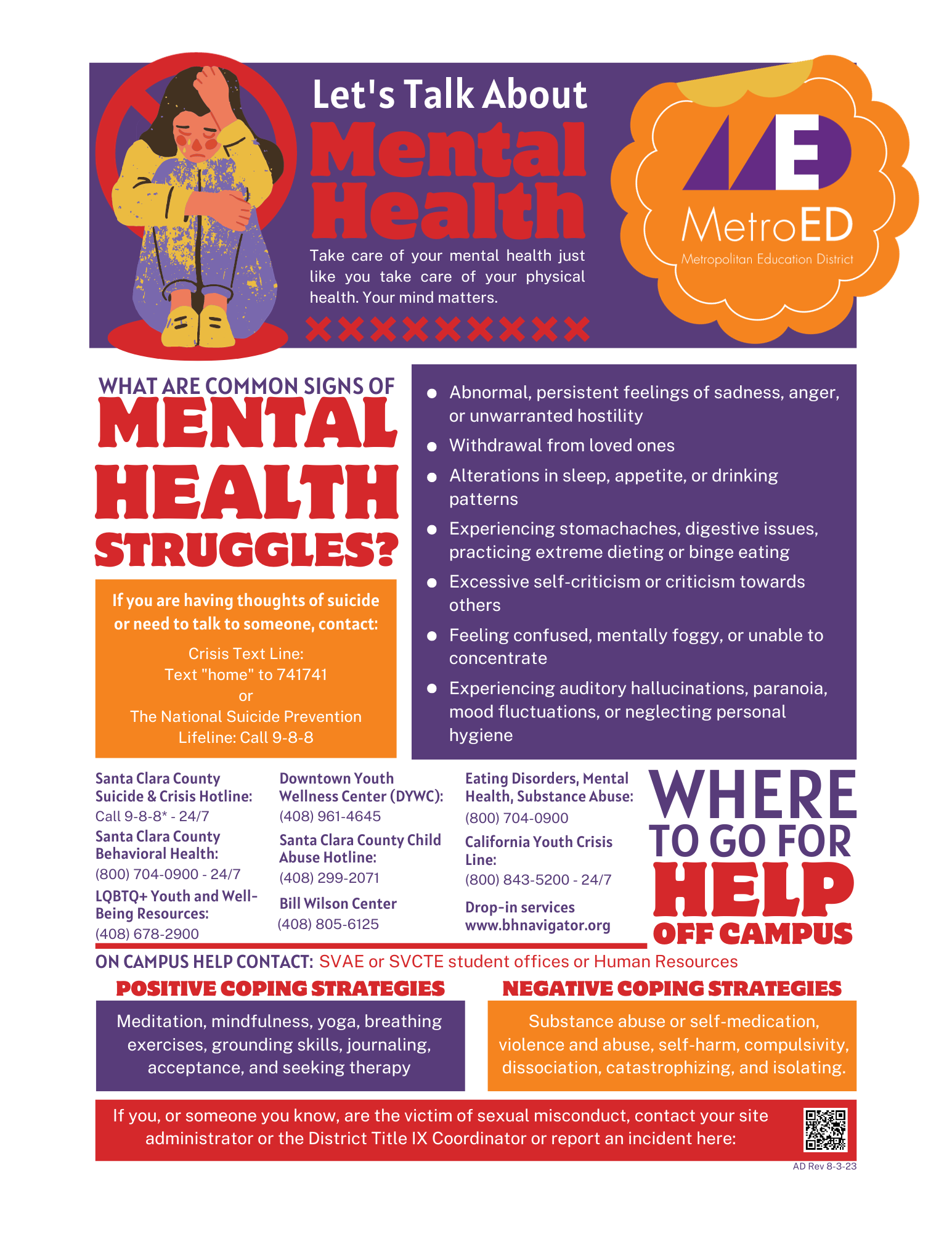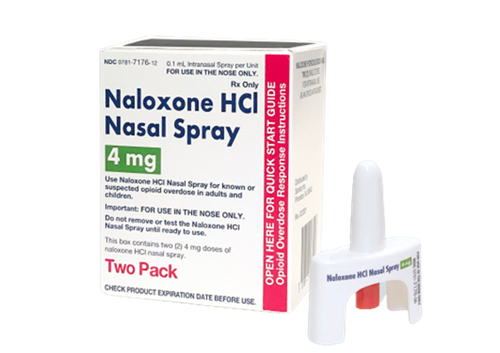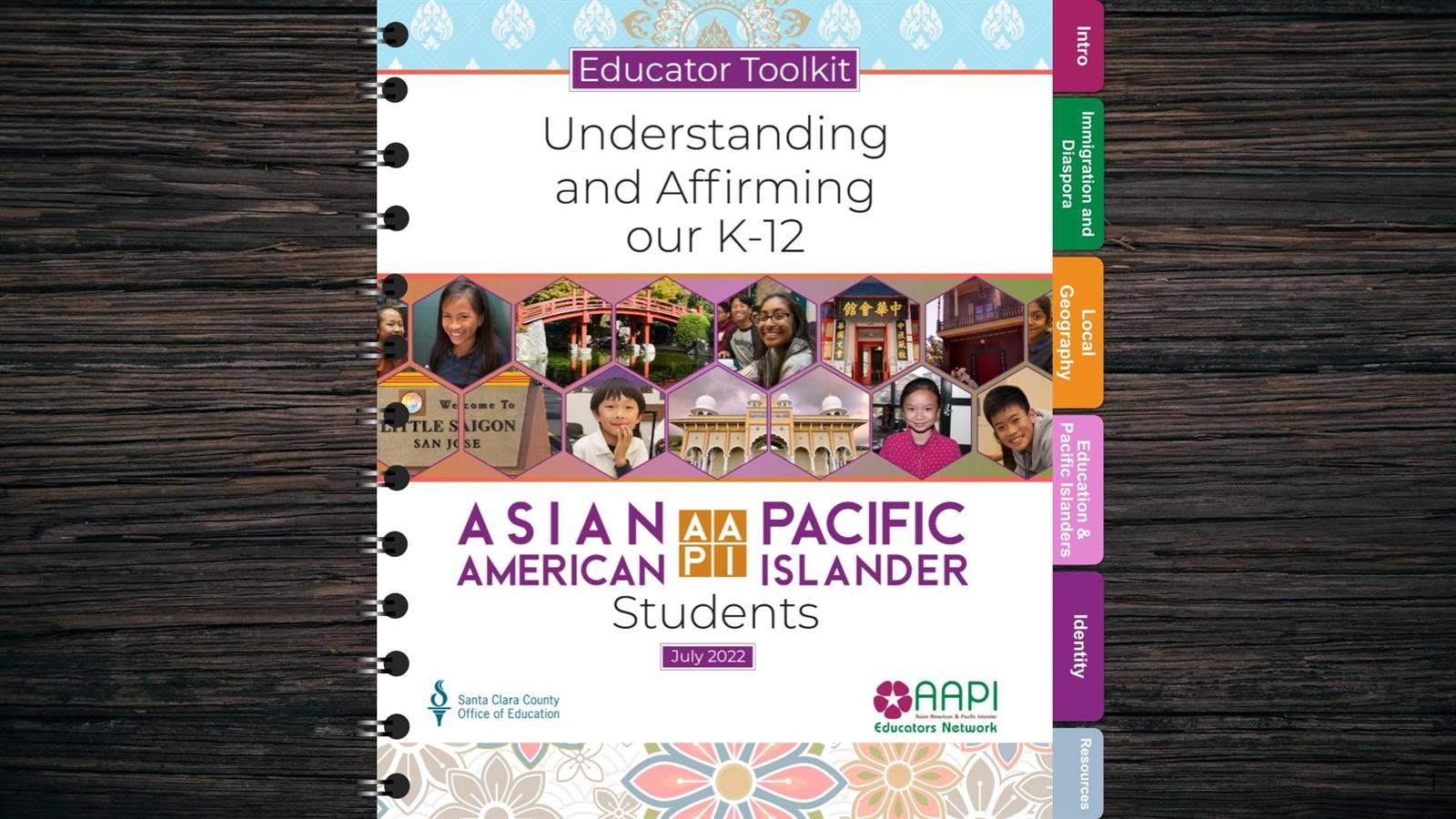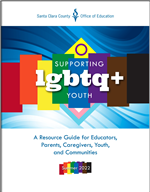- MetroED
- Community Resources
Community Resources
-
Please note: In order to provide the highest level of support to the MetroED community, it is imperative that we educate others about important issues that directly affect our work and the students we serve. On this page you will find resources from outside agencies and organizations that model these practices. Sharing them enables us to truly meet our mission to “prepare high school and adult students for future success in college and careers.”
Supporting Mental Health: Resources and Coping
-
Improve your understanding of mental health struggles by recognizing signs like anxiety, depression, eating disorders, emotional dysregulation, bipolar and schizophrenic episodes. If you need support, don't hesitate to contact the SVAE or SVCTE student offices of Human Resources. Additionally, you can find assistance through suicide prevention hotlines, substance abuse helplines, child crisis services, nonpolice mental health hotlines, public behavioral health services, and community mental health centers.
Take a proactive approach to enhance your mental well-being by exploring various techniques. Consider incorporating practices like meditation, mindfulness, yoga, breathing exercises, grounding skills, journaling, acceptance, and therapy into your routine. These techniques can be incredibly helpful in promoting emotional balance and overall mental well-being. On the other hand, it's important to avoid harmful strategies such as substance abuse, violence, self-harm, compulsivity, dissociation, catastrophizing, and isolation, as these can exacerbate mental health struggles.
Always remember that help is available, and you are not alone in your journey. Make your mental well-being a priority and don't hesitate to seek support when needed. Download our Supporting Mental Health flyer.
Opioid overdose awareness
-
The Opioid epidemic is a serious national crisis affecting public health and social and economic welfare. *In 2019, the misuse and addiction to opioids, including prescription pain relievers and heroin and synthetic opioids such as fentanyl, claimed the lives of almost 50,000 people.
The following informs educators and parents about opioid use, and signs of overdose and provides information about available effective treatment that can save lives. For more information click here.
Educator Toolkit: Understanding and Affirming our K-12 Asian American and Pacific Islander Students
-
The Santa Clara County Office of Education (SCCOE) takes great pride in celebrating the diversity of our students and families. Our county’s diverse population includes more than thirty percent of K-12 students who identify as Asian. The SCCOE is proud to partner with the Santa Clara County Office of Education Asian American and Pacific Islander (AAPI) Educators Network to develop this Educator Toolkit: Understanding and Affirming our K-12 Asian American and Pacific Islander Students. This digital resource is intended to develop broader and deeper knowledge of the local AAPI history and community, and support teachers and administrators in the education and identity development of AAPI students in Santa Clara County. The content of this toolkit is aligned with the History-Social Science Framework for California Public Schools, Kindergarten Through Grade Twelve. See the toolkit linked here.
Supporting LGBTQ Youth Guide
-
The purpose of this Guide is to assist Santa Clara County Public School Districts with their supports for lesbian, gay, bisexual, transgender, and queer or questioning (LGBTQ) youth and allies. It is the hope that the information provided will increase understanding of LGBTQ youth and their rights while also providing guidance for creating inclusive schools.A Resource Guide for Educators, Parents, Caregivers, Youth and Communities. See the guide linked here.
Opioid, Substance Use Prevention Resources for Adults Working With Youth
-
Adult role models play a pivotal part in the growth of students, including here at the Metropolitan Education District. Students turn to them for support during the ups and downs of life, and it is important to be prepared, both emotionally and educationally, to help support and even protect them when necessary. Doing so can make a lifelong difference, including minimizing the chance for them to partake in high-risk behaviors including substance abuse.
The California Department of Public Health has launched prevention resources that educators; youth-serving individuals, organizations and providers; parents; guardians and caretakers can use to communicate with youth about the risks of opioids and other substance abuse.
Some of these tools for educators include:
-
Is This Legit? Accessing Valid and Reliable Health Information
-
Getting Candid: Framing the Conversation Around Youth Substance Use Prevention
For a full list of resources, visit the website.





